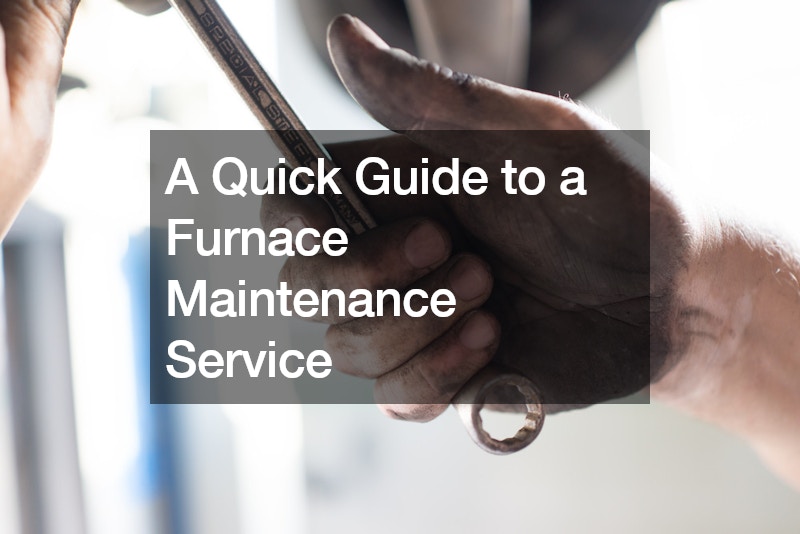A Quick Guide to Furnace Maintenance Service

Maintaining your furnace is essential for ensuring its efficiency, longevity, and safety. Regular furnace maintenance service can help prevent breakdowns, improve indoor air quality, and lower energy bills. In this quick guide, we’ll explore the importance of furnace maintenance, what to expect during a maintenance service, and tips for scheduling and DIY maintenance.
Importance of Furnace Maintenance:
Regular furnace maintenance is crucial for several reasons:
- Preventive Maintenance: Routine maintenance helps identify and address potential issues before they escalate into costly repairs. By catching problems early, you can avoid unexpected breakdowns and extend the lifespan of your furnace.
- Improved Efficiency: A well-maintained furnace operates more efficiently, resulting in lower energy consumption and reduced heating costs. Clean filters, lubricated components, and proper airflow contribute to optimal performance.
- Enhanced Safety: Furnace maintenance includes inspection of critical components such as heat exchangers and gas valves to ensure safe operation. Detecting and addressing safety concerns promptly can prevent carbon monoxide leaks and other hazards.
- Better Indoor Air Quality: A dirty or malfunctioning furnace can circulate dust, allergens, and other pollutants throughout your home. Regular maintenance, including cleaning and replacing filters, helps improve indoor air quality and creates a healthier living environment.
What to Expect During a Furnace Maintenance Service:
A professional furnace maintenance service typically includes the following steps:
- Visual Inspection: The technician will visually inspect the furnace, looking for signs of wear, corrosion, or damage. They’ll also check for any visible leaks or loose connections.
- Cleaning: The technician will clean the furnace components, including the burners, blower motor, and heat exchanger. Removing dirt, dust, and debris improves airflow and efficiency.
- Filter Replacement: Dirty or clogged filters can restrict airflow and strain the furnace, leading to reduced efficiency and performance. The technician will inspect and replace filters as needed to ensure proper airflow and indoor air quality.
- Lubrication: Moving parts such as bearings and motors require lubrication to reduce friction and prolong their lifespan. The technician will lubricate these components to keep the furnace running smoothly.
- Testing and Calibration: Once the maintenance tasks are complete, the technician will test the furnace’s operation and performance. They’ll check thermostat settings, ignition systems, and safety controls to ensure everything is functioning correctly.
- Recommendations: Based on their inspection and findings, the technician may provide recommendations for any necessary repairs or upgrades. They’ll discuss their findings with you and answer any questions you may have.
Tips for Scheduling Furnace Maintenance:
Here are some tips to help you schedule and maintain your furnace:
- Schedule Regular Maintenance: Aim to schedule furnace maintenance at least once a year, preferably before the start of the heating season. Regular maintenance helps keep your furnace in top condition and prevents potential issues.
- Choose a Qualified Technician: When hiring a technician for furnace maintenance, look for someone who is licensed, experienced, and reputable. Check online reviews and ask for referrals from friends or family members.
- Keep Records: Keep records of your furnace maintenance visits, including dates, services performed, and any recommendations made by the technician. This information can help track the history of your furnace and guide future maintenance decisions.
- DIY Maintenance: While some maintenance tasks require professional expertise, there are several tasks you can perform yourself, such as regularly changing filters and keeping the area around the furnace clean and clutter-free.
Invest in a Maintenance Plan:
Consider enrolling in a maintenance plan offered by HVAC companies. These plans often provide scheduled inspections and tune-ups at regular intervals, ensuring that your furnace receives the attention it needs throughout the year. Additionally, maintenance plan members may receive priority service and discounts on repairs or parts, further maximizing the value of the investment. By proactively investing in a maintenance plan, you can stay ahead of potential issues and enjoy greater peace of mind knowing that your furnace is well cared for by professionals.
By keeping your furnace well-maintained, you reduce the likelihood of unexpected breakdowns, ensuring uninterrupted heating during the colder months. Moreover, a properly maintained furnace operates more quietly, reducing noise levels in your home and enhancing overall comfort. Additionally, routine maintenance can help preserve your manufacturer’s warranty by demonstrating that the system has been cared for according to recommended guidelines. Overall, investing in furnace maintenance not only saves you money on energy bills and repairs but also promotes a hassle-free and enjoyable indoor living experience.
Conclusion:
Furnace maintenance is essential for ensuring the efficiency, reliability, and safety of your heating system. By scheduling regular maintenance service and performing routine DIY maintenance tasks, you can extend the lifespan of your furnace, lower energy bills, and enjoy a comfortable and safe indoor environment. Don’t wait until problems arise—invest in furnace maintenance today for peace of mind tomorrow.
.

